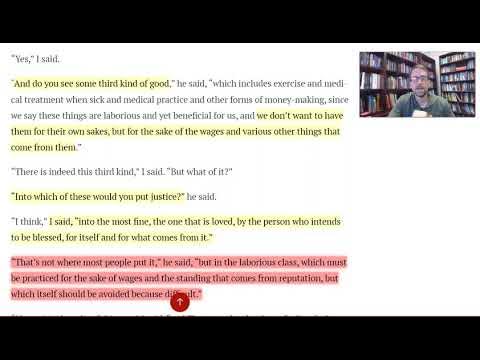The Ring of Gyges—Plato's Republic, Book 2
Summary
TLDRIn the first book of Plato's 'The Republic,' Socrates debates with Thrasymachus about the nature of justice. Thrasymachus initially claims justice is what benefits the stronger, but Socrates refutes this view. Glaucon then challenges Socrates with the 'Ring of Gyges' thought experiment, suggesting that if one could act unjustly without consequence, most would choose to do so. This prompts a deeper discussion on whether justice is intrinsically good or merely a social construct. Socrates suggests an analogy between individual souls and the state to further explore the concept of justice.
Takeaways
- 🤔 In 'The Republic', Socrates debates the nature of justice with Thrasymachus, who initially claims that justice is what benefits the stronger.
- 🏁 Socrates challenges Thrasymachus' definition, leading to a shift in the dialogue from 'what is justice?' to 'is it better to be just or unjust?'
- 🔄 Thrasymachus concedes defeat, suggesting that justice might not be in the interest of the just person, leaving the question of justice's value unsettled.
- 💡 Glaucon introduces the concept of intrinsic vs. instrumental goods, arguing that justice might be a tool for self-interest rather than an end in itself.
- 📚 Glaucon proposes a social contract theory of justice, suggesting that people adopt justice to avoid conflict and harm, viewing it as an instrumental good.
- 💎 The 'Ring of Gyges' thought experiment is introduced by Glaucon to illustrate the potential for injustice when one can act without consequences.
- 🧐 Glaucon challenges Socrates with the question of whether it's better to be just or to appear just, suggesting that the latter might be more advantageous.
- 🤓 Socrates does not immediately respond to Glaucon's challenge but instead suggests exploring the nature of the soul and justice within the state as an analogy.
- 🌐 Socrates' analogy between the state and an individual organism is a contentious claim that has been debated throughout the history of philosophy.
- 🔮 The dialogue in 'The Republic' raises fundamental questions about the nature of justice, its value to individuals, and the ethical implications of its pursuit.
Q & A
What is the main argument Socrates initially takes on in Book One of The Republic?
-In Book One of The Republic, Socrates initially takes on the argument that justice is whatever is in the interest of the stronger, as proposed by Thrasymachus.
How does Socrates respond to Thrasymachus' definition of justice?
-Socrates responds by critically examining Thrasymachus' views and showing the inconsistencies in his arguments, leading Thrasymachus to eventually concede that he cannot maintain his position.
What question does Glaucon raise at the beginning of Book Two that challenges Socrates?
-Glaucon questions whether Socrates is truly persuading them or merely seeming to persuade them, expressing his lack of persuasion by Socrates' arguments against Thrasymachus.
What is the distinction Glaucon makes between instrumental and intrinsic goods?
-Glaucon distinguishes between instrumental goods, which are sought for the sake of something else, and intrinsic goods, which are sought for their own sake.
Why does Glaucon challenge Socrates to prove that justice is an intrinsic good?
-Glaucon challenges Socrates because if justice is merely an instrumental good, it would lack ethical significance and would not be fundamental to how one ought to live.
What is the social contract theory that Glaucon proposes as an alternative to Socrates' view of justice?
-Glaucon proposes a version of social contract theory where justice is seen as a set of rules or principles adopted as instruments to prevent conflict and achieve mutual benefits, rather than as an intrinsic good.
What is the Ring of Gyges and how does it feature in Glaucon's argument?
-The Ring of Gyges is a mythical object that grants invisibility. Glaucon uses it as a thought experiment to argue that people would act unjustly if they could get away with it, suggesting that justice is not an intrinsic good but rather a matter of appearance and consequence.
How does Glaucon use the story of Gyges to challenge the idea of justice?
-Glaucon uses the story of Gyges to illustrate that if one could act unjustly without consequence due to invisibility, they would likely do so, indicating that people are just because they fear the consequences of being caught, not because justice is inherently valuable.
What is the challenge Glaucon poses to Socrates regarding the just and unjust person?
-Glaucon challenges Socrates to consider whether it is better to be a just person perceived as unjust or an unjust person perceived as just, arguing that the latter would have a better life due to the advantages of unjust actions without the disadvantages.
Why does Socrates suggest examining justice in the state before directly addressing Glaucon's challenge?
-Socrates believes that by examining justice on a larger scale in the state, he can provide a clearer understanding of justice in the soul, and thus indirectly address Glaucon's challenge about the nature of justice and its benefits.
What is the analogy Socrates makes between the state and the individual, and why is it contentious?
-Socrates makes an analogy between the state and the individual, suggesting that a state is like a person and can be understood in terms of justice in the same way. This is contentious because a state is not an organism and is better thought of as an ecosystem of organisms.
Outlines

此内容仅限付费用户访问。 请升级后访问。
立即升级Mindmap

此内容仅限付费用户访问。 请升级后访问。
立即升级Keywords

此内容仅限付费用户访问。 请升级后访问。
立即升级Highlights

此内容仅限付费用户访问。 请升级后访问。
立即升级Transcripts

此内容仅限付费用户访问。 请升级后访问。
立即升级5.0 / 5 (0 votes)






